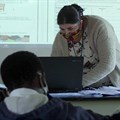As classrooms today become more diverse, so the need for personalised learning journeys has increased.
In order to ensure each student reaches their full potential within these diverse environments, the adoption of adaptive learning has become non-negotiable, says Malecia Makgata, instructional designer at The Independent Institute of Education.
“The traditional one-size-fits-all approach to teaching is becoming increasingly outdated as adaptive learning comes into its own,” she continues.
As classrooms and student bodies continue to diversify in several areas, including but not limited to culturally and ethnically, with various curricula preferences, language diversity, learning styles and abilities, and socioeconomic diversity, the need to harness technological advancements in learning becomes ever greater, she says.
“Adaptive learning is a revolutionary method that tailors educational experiences to meet the unique needs of each student. By leveraging technology and real-time data, adaptive learning systems can adjust the pace, style, and content of instruction and just-in-time feedback, ensuring that every learner can achieve their full potential.”
Inclusive engagement
Makgata says the importance of adaptive learning cannot be overstated. It not only enhances student engagement and performance but also fosters an inclusive environment where all students feel empowered and supported.
“To truly embrace the benefits of adaptive learning, educational institutions must rethink and redesign their teaching strategies, moving away from rigid syllabi and towards more flexible, personalised learning experiences. This shift is essential for preparing students to thrive in an increasingly complex and dynamic world,” she says.
Makgata says the days of the traditional classroom experience – where everyone learned at the same pace, using the same textbooks, and listening to the same material taught by their teachers – are rapidly fading.
Personalised learning journeys
Adaptive learning, also known as personalised learning, is an innovative approach to teaching and learning that uses AI and learning management systems (LMSs) to tailor-make learning paths for each student, meeting them where they are in their learning journey, whilst still working towards the common goal of achieving the learning outcomes in a specific course.
“Imagine a learning journey where you receive instant, personalised feedback pinpointing areas for development and growth, accompanied by tailored recommendations for resources and learning pathways that address your unique needs – empowering you to bridge knowledge gaps and solidify new skills at your own pace, accelerating or decelerating as needed,” explains Makgata.
“With personalised learning, this is a reality. By tailoring the learning experience to individual students' needs, interests, and learning styles, personalised learning increases student engagement and motivation, leading to improved academic achievement and increased graduation rates. Whether you quickly master a concept because the content perfectly matches your learning style or cognitive development level, or need extra support to grasp a difficult idea, personalised learning ensures a more enjoyable and effective experience, resulting in higher student satisfaction and reduced dropout rates.”
Urgent implementation required
While adaptive learning plays an important role at school level, it is imperative for higher education institutions to embrace the adaptive learning approach as rapidly as they can, Makgata says.
“It is especially beneficial for students with diverse learning needs, including those with disabilities, language barriers, or varying learning styles. It improves equality of opportunities and empowers students to learn in a way that suits them best.
“Lecturers also benefit, as they can now focus on guiding and supporting individual students by utilising LMS system analytics and the results from micro-assessments to quickly determine where students require additional support or even more challenging approaches, enabling them to adjust their instruction on-the-go,” says Makgata.
She says it is evident that personalised learning has a profoundly positive impact on students.
“By tailoring the learning experience to individual needs, personalised learning increases students' interest and learning achievement, while also enhancing critical thinking and problem-solving skills.
“This flexible approach empowers students to learn at their own pace, fostering a sense of autonomy and agency. Ultimately, personalised learning enables students to become more confident and effective learners, better equipped to embrace challenges and pursue lifelong learning with enthusiasm and resilience.”




































